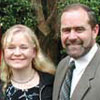 By James G. Smith – BBFI Associate Mission Director
By James G. Smith – BBFI Associate Mission Director
Some of our earliest childhood memories have to do with playing games. From the start of the game when we choose the color of our token, through the progression of the game, to the final satisfaction of the end accomplishment, we have a simple illustration of real life. Let’s use that illustration to show the journey to becoming an effective BBFI missionary!
The evangelization of the world and the fulfillment of the Great Commission has been the heart of God and His people since the time of Christ. Since the Holy Spirit came to indwell believers on the Day of Pentecost, His purpose has been to empower believers to bear witness of the light of the gospel. Our job, as believers connected to that power, has always been to share the Good News.
For fifty-nine and a half years, pastors of the Baptist Bible Fellowship International have been approving missionaries sent out by local Baptist churches to go to people groups around the world. Some of the details in that approval process have changed over time, but the basic system has remained intact. This concept of local churches sending missionaries to make disciples and establish local churches in other parts of the world and among people different from themselves goes all the way back to Acts 13.
According to the U. S. Center for World Mission, there are approximately 16,000 different major people groups in the world. Of this number, 6,880 are considered unreached or least reached.
Wycliffe Bible Translators defines a people group as, “A large sociological group of individuals who see themselves as having a common affinity with one another. From the viewpoint of missions, a people group is the largest possible group within which the gospel can be spread without encountering barriers of understanding or acceptance.”
The churches of the Baptist Bible Fellowship International take seriously the responsibility to plant indigenous churches among all those people groups. It is imperative that our churches be sensitive to the Lord’s leading in the lives of the followers of Christ in our care. Global Partners wants to encourage young people to obey the will of the Lord, prepare for His service in a cross-cultural context, go through the steps delineated in these next few pages, and become part of our great team of interdependent missionaries identified with the Baptist Bible Fellowship International.
We are virtuously proud of the servant-leaders that God has saved, placed within our churches, and then called to take the Good News far away. We have asked some of them, including missionaries from different continents and different generational perspectives, to share their experiences in the process of becoming BBFI missionaries. Hopefully you will enjoy the very personal aspect of each step and will find this an interesting mix.
Also, consider your personal participation. Every game has spectators and cheerleaders. Most games have commentators and critics. I know for sure that every game needs participants. Consider your part. Get in the game!
 Can You Hear Me Now?
Can You Hear Me Now?
By Keith & Debbie Gandy, Germany
Paul Marcelli is the New York actor that personifies the 50 Verizon employees who each drive 100,000-plus miles annually to test the reliability of the Verizon network. Has the actor and the marketing emphasis brought the desired dividends in a highly competitive market? From 2002 to 2004, Marcelli and his well-placed ads were able to not only gain market share, but reduce customer turnover. In the world of balance sheets, that is a good thing.
As children of God, the question we constantly pose is, “Can I hear Him now?”
Theologians will argue concerning the validity of a biblical calling — is it a command or a call? Do only vocational workers receive such a call? In essence, that is the thrust of Gary Friessen’s helpful, albeit controversial, 1980 volume Decision Making and The Will of God. Friessen would argue that there is no specific will of God for the individual believer, but rather the exercising of wisdom, based upon the guidelines of what scripture indicates.
Nonetheless, there are strong examples of specific task-oriented men who received a clear indication of what their ministry was to entail, and to whom it would be:
Jonah – not to the people of Tarshish, who also needed the gospel, but rather to the inhabitants of Ninevah.
Jeremiah – the prophet called from the womb who could not voluntarily lay down his assignment due to his deep-seated passion, even when he experienced pain as a result of executing that calling.
Barnabas and Saul – specifically separated for the task of reaching out cross-culturally.
Pastors – Ephesians 4:11 seems to indicate that God will give specifically gifted men to mature the body.
While theologians wrestle with the scriptural principles, I personally sense a specific command tied to a specific people group: Germans. This does not mean that the subjective, pragmatic experience of one person will in any manner provide a convincing argument towards answering the biblical question. It simply indi¬cates that my identity in Christ is momentarily locked in a specific direction.
As a 17-year-old whose life was not in any fashion Christ-centered, the abduction and subsequent murder of a work colleague shocked me and caused me to question where her soul resided in eternity. I had never shared the gospel with her and that burdens me to this day. Over the following months, I wrestled with whether I would put Christ first in my life for the first time. I eventually surrendered my heart to Him, never wanting another friend to enter eternity without at least having heard an explanation of the good news of Jesus Christ.
Within a few short weeks of that decision, I sensed a burning desire to eat sauerkraut. Well, maybe not! I did have a desire to minister among Germans, a people and culture not yet mine. Unexplainable? Well, maybe.
Psalm 37:4 records: “Delight thyself also in the Lord, and he shall give thee the desires of thine heart.” That is not a new age guarantee that if you generate happiness in Jesus, all your Disney fantasies will somehow be cosmically fulfilled. It indicates something even better. When Jesus becomes the absolute focal point of your heart, you can be assured that the desires you carry were planted by Him.
Can it be that a person who has dealt with Jesus becoming the Lord in his or her life will come to a place where Jesus plants His direction and will? That is what this Psalm seems to indicate.
Does that constitute a call? Is that only restricted to full-time vocational Christian workers? Does that specifically indicate the details and duration of the calling? Once again, there appears to be room in that passage to indicate a leading of Christ, and that it will be individually tailored.
It is wise to filter the dreams of a 17-year-old whose life has been turned upside down from the emotions and shock of tragic circumstances. At the very least, in the case of this missionary/church planter, hundreds of Germans will line up and state that they are thankful that someone cared enough, that someone had the passion to go, and someone had the passion to sacrifice and send.
Additionally, following Jesus is not for the faint-hearted. Alan Redpath, the English writer, is famous for the words: “When God wants to do something impossible, he takes an impossible person and crushes him.” Pain, even deep pain of the soul, will cause any person to question whether running is the best answer. However, that “calling,” that deep-seated assurance that their personal identity is tied to ministry that brings pain, is what allows the soul to push through the fog until clarity returns.
It is my strong impression that there are people who will experience a Psalm 37:4 desire that cannot be explained away or denied. That passion must find expression. In my estimation, that meets the criteria of what in practical circles would entail a “calling.”
Even as theologians continue to debate the biblical basis of a “calling,” even as we cannot agree on the biblical definition and application of the concept, we must agree that there is a need and those with the skill-set must go and be sent.
Somehow you read the pages of the Gospels and Acts and hear the voice of the Savior asking clearly, “Can you hear me now?”
 Preparation at Baptist Bible College
Preparation at Baptist Bible College
By Jesse & Glenna Parnell, Uruguay
When I received the call to be a missionary, I was 14 years old and was attending the church where I had given my life to Christ the year before. Over the next couple of years, I began to grow in the Lord. I met my future wife, Glenna, at our church youth meetings and we began dating. We shared a call and leading to the ministry, so when we were married, we decided to go to Springfield, Missouri, on our honeymoon to visit Baptist Bible College.
While there, we monitored a church history class. I should have chosen any class but that one because I didn’t have a clue what was going on, and I left thinking there was no way I could pass that class. I don’t know if it was that experience or something else, but we decided to stay at our local church and not go to BBC at that time.
In March 1976, an evangelist came to our church and the Lord used his preaching to bring me to a very important conclusion in my life. I realized I had been called to the mission field but wasn’t moving toward the fulfillment of that call. That night I told Glenna I planned to be in Bible college by September. In May, I accompanied my pastor to the fellowship meeting at BBC and began making arrangements to start school.
The professors at BBC were both spiritual and practical, giving us a good education and preparation for the mission field. Missionary Elmer Deal was teaching missions during that time and his passion showed as he shared many of his experiences on the field. There was great emphasis placed on our spiritual walk with the Lord. I especially remember the special “lectures week” each semester. I always looked forward to them with much anticipation. The chapel speakers were often pastors who challenged us to go forward.
We had gone to BBC to get the preparation necessary to be missionaries and move on to the next step. We were given the privilege of returning to our home church in Odessa, Texas, to do our internship. During the eight years after surrendering to be a missionary, I had the opportunity to come in contact with many different missionaries and mission groups. We decided that the BBFI had the best mission program and there was no doubt that we wanted to be BBFI missionaries. In May 1980, we were approved as BBFI missionaries to the country of Uruguay.
 Internship is Necessary
Internship is Necessary
By Jason & Nadia Kratochvil, Nicaragua
When I look back at when my wife and I graduated from Baptist Bible College, our minds were full of great information we had received from our studies, and we were confident that it would aid us in reaching Nicaragua for Christ. There was just one problem: we were so green! The grandeur of walking in the footsteps of great missionaries such as Hudson Taylor and Fred Donnelson filled our eyes, yet we were still crawling, lacking the practical experience needed to take those first big steps.
A short time after graduation, we were contacted by Edgewood Baptist Church in Rock Island, Illinois, where Mel Brown is pastor. They asked if we would be interested in their mission’s internship program — which of course we were. After a weekend interview, we were brought on staff.
The next two years developed into an intense practical training program that prepared and equipped us to face ministry and life experiences that we could never have expected. We were trained and then given the liberty to apply that training in areas such as preaching, officiating marriages and funerals, starting new ministries, counseling, dealing with issues and problems both within families and the church, church administration, music, and children’s ministries.
One aspect of our internship for which I will be eternally grateful is that the focus was not only on the “ministry.” A great portion was also focused on understanding and developing ourselves so that we could do the work God called us to do more efficiently and with excellence. Great priority was given to strengthening our marriage, which is vital as missionaries going to a foreign country. Each of the three pastors on staff gave us personal time each week to focus on building us in different areas of life and ministry.
As a missionary now living in Nicaragua, I can honestly say that without the training that we received at Edgewood Baptist Church, we would have been severely handicapped as missionaries in our first few years here. We have grown and learned many new things, yet we are constantly using techniques and applying principles that we developed during our internship at Edgewood. While the culture in Nicaragua is different, the principles are the same. I will forever be grateful to Pastors Mel Brown, Tim Green, and Ed Kuriscak for their investment in our lives and ministry. The internship program at Edgewood was both the hardest and most fulfilling experience we had faced up to that point in our lives, and it not only pushed us but it also enriched us and enabled us to serve the Lord in ways that we had not considered before. In my opinion, an internship is not only important but necessary for every missionary going to another country for the first time. I believe it could mean the difference between success and failure in those first few years on the field.
 The Application Process
The Application Process
By Sally Gritts – BBFI Mission Office
I was seven years old as I watched my parents be approved in 1982 as Baptist Bible Fellowship International missionaries. While sitting with my grandparents in the W. E. Dowell Fieldhouse, I was taking it all in and thinking how exciting it all was. We, as a family, were going to England to tell people about Jesus! At that time, I had no idea I would eventually be so personally involved with the process that brought my parents to that point in their lives. Twenty years later, I went through a similar process and was recognized as a TEAM missionary to England while my parents sat on the stage behind me. Today, I am still involved in this process as I’m now part of the team who helps prospective missionaries navigate the route to approval or recognition.
A prospective missionary’s first contact with the Mission Office is usually a nervous phone call or email to the new candidates office. We make every effort to help them feel at ease and answer any questions they may have. When they are ready to make an application, we ask that they do so by either sending us an email or letter. Receipt of this prompts us to send out an application packet, which outlines the necessary paperwork. In addition to the application, we ask for personal testimonies, a belief statement, college transcripts, and recommendations from the sending church, internship church, and other pastors. A physical must be submitted and some medical history paperwork must be completed. A background and credit check is conducted on each applicant and spouse. Candidates have approximately 12 weeks to complete the paperwork and medical tests. Providing all internship, educational, and application requirements have been met, a missionary candidate is presented to the pastors on the Mission Committee and then to the entire Fellowship for approval/recognition.
Candidate school is the final piece of the process. Each year, candidate school is held in July at the Mission Office. Career missionaries attend two weeks: the first week in the year they are approved and the second week the following year. TEAM missionaries attend one week in the year they are recognized. This is an intense time of learning for the missionary. Areas addressed include spiritual, relational, and practical aspects, as well as Mission Office procedures. The subjects covered encompass a vast range, from budgeting and safety in a different country to keeping one’s spiritual life active and what to expect when visiting a church.
I really enjoy working with new missionaries and am looking forward to the upcoming approvals and recognitions in May. In addition to helping many great new candidates, I will have the opportunity to take my little brother and his wife through the process!
 Deputation: Obstacle or Ministry?
Deputation: Obstacle or Ministry?
By Eric & Amanda Shadle, Ethiopia
Our family was approved as BBFI missionaries to Ethiopia in September 2006. Like most missionaries, we traveled the United States presenting our ministry to different churches, groups, and families.
We learned very quickly that deputation is unique for every family. Some missionaries may take longer getting to the field than others. This may require them to make more calls to pastors and to present their ministry in more churches. God may want to grow one missionary family in a different way than another. It was good in those times for our family to remember that God has a different plan and purpose for each family raising support for their area of service. We were reminded not to compare our support level or our deputation time with others, but to acknowledge that we were right on the timeline God had for us in getting to Ethiopia.
Some may have the idea of deputation being an obstacle to be overcome so that real ministry can start. Our family traveled for several years presenting the field of Ethiopia. It was important in those times to remember that ministry for our “deputation family” was already taking place. We tried to focus on being a blessing to the next pastor and the next congregation knowing that this was at the heart of ministry. The goal was not to just reach Ethiopia, but to love God and those we would be presenting our field to in a unique way. This helped us to see each pastor, church, and individual as an opportunity for service while we made our way to Ethiopia.
Our deputation experience allowed us to meet pastors and churches all over America. Spending time with these churches and seeing their sacrifice for missions has changed our family. Their support is not just about finances but attached to it are real people and memories from our time spent with them. A stronger faith and having the privilege of watching God make a smooth path for our family are some of the blessings. Watching Him provide in very personal ways, and hearing how He was working in the lives of those in the churches left a permanent impact. Deputation provided the opportunity for many different areas of growth to take place in our family’s life and ultimately to further prepare us for our field of service.
 Attitude Matters
Attitude Matters
By Beau & Valerie Moore, Portugal
Over the past year I have often thought, “Every Christian should spend a few years of his life on deputation.” This is a completely different tune from what I was singing at the start of our travels. I thought to myself, “What an ineffective system we have for getting missionaries to their countries. In the time that I am wasting here in the States, I could be on the mission field seeing souls saved.” Over the past two years, God has taught me that I needed to experience a few things in order to make it on the mission field.
Most missionaries’ first experience is financial. I left my six-figure income and began collecting $400 per month from my sending church with taxes and health insurance far exceeding that amount. I was shocked to find that our expenses actually increased when we became missionaries as gas reached $4.76 per gallon and a Motel 6 charged over $100 per night as we traveled the New England states.
Deputation put us in a position to experience God’s provision as only one can on deputation! We have a wealth of experiences concerning God’s faithfulness in provision to recall during those tough financial times once we reach Portugal. The more financial burdens we faced as God stretched our faith, the more we trusted Him to provide.
As we both quit our full-time jobs and sold our second car, we didn’t realize just how much time that meant we would spend together. We have traveled over 100,000 miles, bought 14 new tires, and could write a book of humorous RV stories. This new “with-you-24-hours-per-day” schedule was challenging for only a short time until we both quickly realized that there were moments that we were each other’s only source of encouragement. We had better get our attitudes straight if we wanted to have a single friend in the world! During the lonely times of deputation, a spouse becomes a lifesaver.
Our attitudes began changing about deputation as we started treating it as our current ministry instead of something we had to endure to start our “real ministry.” Early on we had a bad experience with a church that promised support and reimbursement of our travel expenses (of which we received neither). Through that, God taught us that deputation was not about us. We realized that God was the One opening the doors to the particular churches we were in and there was a purpose for each and every one. If we weren’t going to receive support, maybe a particular church member needed to be exposed to our burden so God could call him to be a missionary. Maybe we were there because the pastor needed a listening ear and a source of encouragement during a difficult point in his ministry. Maybe we were there to witness a particular ministry idea to add to our list of “definitely do this” or “definitely don’t do that.” Instead of expecting to receive from a church, we expected to contribute. It was just an added bonus when we were blessed in return, and we very often were.
In two years, we have visited almost 150 churches. About half have taken us on for support, and we are so thrilled to be leaving for a European country after only two years of deputation. We give God all of the glory, of course, but we have had two little secrets to our ministry to which we attribute our success.
The first was a weekly email we called the “Tuesday Newsday.” We made it a mission to find a few prayer warriors in every church, to present them with our most pressing prayer requests, and to keep the members plugged into our ministry with these updates. This list had grown to over 700 people praying for us every Tuesday, and we know that it is through their prayers that God has worked so many miracles in our lives.
Our second secret has been our two beagles that have made themselves memorable in many churches by appearing on our prayer card and in the “Tuesday Newsday,” and by meeting the kids after services. Paisley even has her own supporting church as one pastor made sure we knew their church was taking us on because of the dogs! Of course our beagles have now taken the back burner to our beautiful little three-month-old daughter, Avery.
Our last deputation prayer letter was sent just days before we left for Portugal. In it, we reflected over the past two years of deputation. We ended the letter with, “…the blessings of deputation have far outweighed the burdens. Overall we have had a wonderful experience. We recognize how valuable these life lessons will be once we reach the field. What a great training ground for exercising faith in your Christian life.” Deputation has been essential in confirming our commitment to our call and increasing our burden for Portugal. We are so glad we had the opportunity!
 Importance of Language Learning
Importance of Language Learning
By Georgia Webb, Mexico
A missionary candidate once asked me, “Do you know of any successful missionary who did not have much language aptitude?” My answer was “Yes, I have known some, but all of them had done their best to learn the language.” I have never known one successful missionary who did not work at learning the language.
Another missionary candidate told me frankly that he had no intention of learning the language, that he planned to use an interpreter. He soon went back to the United States.
It is possible to be fluent in the language and to fail as a missionary, or to be deficient in the language and succeed in the work, but I do not believe the latter will be true if the missionary does not do all he can since acquiring the language is of paramount importance!
It is my opinion, based on 61 years of observation, that failure to acquire a working knowledge of the language is the number one cause of missionary casualties. This is sometimes true even when it is not the expressed cause. It may be the underlying cause even when the missionary says, and most likely sincerely believes, that he is leaving the field for other reasons.
The real reason may simply be that this missionary is unhappy. Without the language, there can be no cultural adaptation. Once a new missionary gets over the excitement of being where the Lord has called him to minister and a certain fascination with all that is new and different, a sense of loneliness and homesickness sets in. This is natural and will go away as the missionary learns enough of the new language to be able to participate in the life of the country. But if there is no language learning, there is no cultural adaptation, and the missionary has no life outside of his family and other English-speaking foreigners. He then becomes unhappy and leaves the field.
Then too, not knowing the language results in much frustration in the ministry. How can you lead someone to the Lord if you can’t speak his or her language? How can you counsel effectively through an interpreter? I was told of a missionary who in a large evangelistic meeting told the audience through an interpreter that if anyone would like to know more to call and talk to him. Someone in the audience responded, “How can we? You can’t understand us.”
Preaching or teaching through an interpreter is usually very unsatisfying, no matter how good the interpreter is. In the early days of the work in Mexico, G. Beauchamp Vick, who was noted for his very eloquent messages, came to Mexico and preached in our churches. His interpreter, missionary ‘Big Jim’ Smith, told him, “Keep it simple, Dr. Vick, because no matter how much steak you put into it, when I finish with it, it will be hamburger meat!”
In these days of a global economy, English is spoken in many parts of the world. It becomes a temptation to some missionaries not to bother to learn the native language of their people, but the hearts of people can rarely be reached except through their heart language, their mother tongue. It takes a great deal of effort and prayer to learn a new language, but it is worth it.
Learning the language requires a willingness to make mistakes, be corrected, and even be laughed at. When I first got to Mexico, I worked with a national pastor who was always getting up in front of the congregation and saying, “Have you heard the latest of Luisa’s jokes?” It wasn’t fun to be laughed at, but at least I learned not to say that again. Eventually I realized they weren’t laughing at me, they were laughing at the hilarious things I said.
Languages vary in their degree of difficulty for English-speaking people. Some use that fact as an excuse not to bother with language learning. But the fact that the language of one’s people group is harder than some others just means it will take longer to learn. But no language is unlearnable. To a child, one language is as easy to learn as another.
Now for some recommendations.
1. To future missionaries:
Expose yourself to foreign languages as much as possible now. Study one if possible. Make the acquaintance of people who speak another language. Listen to recordings of other languages. Listening is the first step in language learning, so listen, listen, listen.
I do not recommend trying to learn a language on your own. I tried to do that with German. When I finally found a German lady to help me, I realized it hadn’t worked. You will need correction.
Learning all you can in advance pays off. I had two years of Latin in high school. Then I had 10 semester hours of Spanish in college, and later took private classes at a Berlitz language school. The result? I started teaching in Spanish three weeks after I got to Mexico. However, this will not be true in all cases. Remember, I had a national pastor who always corrected any mistake I made and told everybody about all the funny ones!
Back then, in 1948, we knew nothing about language school. But we do now. I highly recommend that new missionaries enroll in the very best language school they can find, preferably on their field of service. Most will need the organization and discipline of a school. If none are available, by all means find a good tutor, one who will correct you… and maybe laugh at you!
2. To pastors and churches:
Encourage new missionaries to make language learning their priority. You want them to reach people for the Lord and build indigenous churches on the field. Help them see that this can only be accomplished if they take the time to learn the language and the culture. Your missionaries appreciate and respect you. You will be a blessing to them and to their work if you influence them to make language learning their priority.
 The Best Tool
The Best Tool
By Vernon & Mary Smith, Tanzania
As foreigners in a developing country, we have the appearance of being very rich people. We have a decent vehicle to drive, a nice home, clean clothes, and plenty to eat. Most of the people we deal with do not have these things. Therefore, the gulf between us can seem quite wide, and as missionary strategists we ask ourselves, “How will we bridge that gulf? How will we communicate the gospel to them?” In our experience here in East Africa since 1990, there is no greater tool than opening your mouth in the language of the host country in a mannerly fashion.
I remember going into a lumberyard office one day. There were at least eight people sitting in chairs and waiting. The older gentleman behind the desk at the end of the room appeared to be the one in charge. I immediately stuck out my hand as I headed towards him to shake his hand. I uttered one word — “Shikamoo” — to the man. It is a very respectful term of greeting reserved for those who are older or higher up in societal rank. When I said that one word, showing proper respect, immediately the office was abuzz with, “Oh…that foreigner knows Swahili, he really knows Swahili.” But I had only said one word. The key? Language and manners. By showing respect I gained respect.
When Mary and I embarked on the journey of language learning, we had set our jaw and made a commitment to learn the language no matter what. We prayed and asked God to not only give us the language for the sake of gospel communication, but to give it to us so that we could have some social satisfaction, i.e. friendships in the host language, and eventually the ability to be spiritually satisfied and to be able to truly worship in another language besides our mother tongue. God has granted our requests in every area that I’ve mentioned.
Some keys to language learning:
1. Commitment. Language learning has been the hardest academic thing we’ve ever done. I don’t think I have ever put any more effort into any one thing as I have language learning. Yet, the ability to communicate the gospel freely has been priceless!
2. Forward thinking. A missionary must not sacrifice his/her future ministry of communication by yielding to the needs of the moment. The temptation is to just get a translator, go and preach, get some people on board, and then be able to give a good report to our faithful supporting churches. However, whenever possible, direct communication is absolutely the best choice. Not only is this a benefit from a ministerial point of view, but also it is of benefit for longevity’s sake on the field. If missionaries can form friendships because of their ability to communicate, they will obviously be more personally satisfied with a host culture.
3. Willingness to laugh at oneself. Learning a new language is difficult! One will make mistakes. Humility and a good sense of humor will go a long way in helping the missionary to learn the language. At the end of our language school training in East Africa, Mary and I invited the teachers over for a pizza party. We agreed to speak Swahili the entire evening. As Mary explained the culture of eating pizza by the slice and with your hands, she inadvertently mixed her vocabulary, and instead of saying “we eat this type of food with our hands,” she said “we eat this type of food with our feet.” The teachers, with surprised and humorous looks on their faces, began to remove their shoes! After a good laugh, you can bet that Mary has never made that vocabulary mistake again! I have made so many mistakes from the pulpit (sometimes funny, sometimes not) that it would take many pages to explain them all.
At the end of the day, I can say that I have certainly enjoyed my four-wheel drive vehicle, decent clothes, good house, etc. However, our best tool by far has been the tool of language. Whenever possible, the missionary should learn the language of the host country, and learn it well.
 Cultural Adaptation
Cultural Adaptation
By Jim & Amy Smith, Japan
The first year in a foreign country is like an extended boot camp. While my boot camp for the Marine Corps only lasted 13 (seemingly endless) weeks, stretch that out to a year and you have a fairly good picture of what this experience is like. First, there is the adrenaline rush, the “Wow, I’m really here!” phase. This is followed by a somber realization that, “Wow, I am really here,” accompanied by the notion, “Okay, now what?” Then, there is a more somber realization that you have no idea what is going on, but that you’d better get to work, fast. After a few weeks of hard labor, you realize that you have to pace yourself because this is going to be a long haul.
There is no fast and painless way to learn a new culture. It’s easy to learn about any culture. There are dozens of great books on Bushido or the Samurai spirit, and tea ceremony, and tatemae (public expression), and honne (true thoughts). Anyone can learn about Japanese culture. But to really learn it is to live it, and in the case of Japan, it’s all tied up in language. Language isn’t just a vehicle for expression, but is in itself a cultural forum with its own intricacies and influence. Every once in a while I hear of “missionaries” in other organizations here in Japan that conduct all their activities in English. There may be a few foreigners here who can receive the Word of God in English, but not many Japanese. It isn’t so much that Japanese aren’t well trained in English, because some are quite fluent. But if you want to make a heart connection somewhere near where culture and reality intersect, then it had better be in their own language.
I have found that an excellent way to learn Japanese, and perhaps other languages as well, is a combination of intensive learning combined with opportunities for application. Full-time language school gave me the basic knowledge to get started, but without opportunities to apply what I learned that day, things were easily forgotten. My Korean counterparts, for example, excelled because they worked part-time jobs after school and had not only opportunities but the necessity of using everything they knew to understand and be understood.
Regardless of who you are, learning language takes a tough skin. I learned to swallow my pride every time I made a mistake and people either looked at me quizzically or perhaps even laughed at me. I’d like to share a funny anecdote about language faux pas, but actually, I think my wife holds the title for “Most Egregious Language Error.” I’ll let her tell it.
“During my undergraduate Sophomore year, I came to Japan for the ‘Year-in-Japan’ study abroad program. Some people looking for English conversation took me to lunch and learned that I spoke a little Japanese. They probably thought, “Let’s have some fun,” and started asking me questions in Japanese. First, they asked me what I wanted to bring home as a souvenir. I proceeded to tell them that I wanted some pearls for my mother. However instead of saying the word for pearls, I confidently told my new friends that I wanted “mutual suicide like Romeo and Juliet” for my mother. Then they asked about my favorite Japanese dessert. Well, I had become very fond of Japanese sweet bean paste (anko) used in many traditional sweets. But instead of anko I said unko. Let’s just say that the latter is also a brown substance… I think that’s probably the best laugh those Japanese folks had ever had.”
A lot has happened since we came to Japan. Our entire family has learned a few things about Japanese culture and language, but it is a lifelong process. However, now as we are starting our first work in Saitama Prefecture, we are seeing some of the fruits of our labors and the labor of prayer that so many in our supporting family have undertaken. Just this past month, we have seen our first two professions of faith here at Wakaba and we hope to see many more. We are grateful to God and all who faithfully support this ministry for the privilege of being ambassadors to Japan.
 The Journey
The Journey
By Jon Konnerup – BBFI Mission Director
In this issue of Global Partners, our intent has been to show the process of becoming a Baptist Bible Fellowship missionary for one who is called of God to serve on the foreign mission field and who desires to use the BBFI Mission Office as his service center. It all begins with the call of God upon that person or couple, and it is this call that helps keep the missionary on the field when trials, discouragements, and attacks come his or her way.
Two things I believe strengthen and prepare our missionaries the most are the education and internship requirements. Many facets of cross-cultural ministry with an emphasis on church planting are covered during a missionary’s time of education. Our missionaries use different methods to reach out to their communities, but their ultimate goal is to share the gospel and establish local churches.
The internship process our missionaries go through enhances their abilities to accomplish that goal. We have found, for the most part, that the longer the internship in a BBFI-affiliated church, the shorter the deputation experience of raising financial support. We are one of the few independent Baptist mission groups that require a one-year minimum internship before going to a foreign country as a career missionary.
The deputation process is a time to build one’s faith and trust in the Lord. This process was a great experience and training for me as I later encountered numerous situations in Kenya. If I had not learned to put my faith in God to supply my needs and take care of my family, I might have crashed and burned. An added blessing was to build a prayer team that I knew was praying for us. When discouragement came, knowing they were lifting us up in prayer encouraged us to keep going forward for the Lord.
This process set up by the pastors of the BBFI has worked well for years. We must understand our world needs more people from our churches answering the call and going through this process.
Our prayer is that more churches will become sending churches and that many more people will follow the call of God to serve in another country. As a result, they will experience the blessings of God upon their lives just as did the ones you have heard from in this issue. May the Lord bless the efforts of the churches and missionaries of the BBFI in reaching our world with the gospel of Jesus Christ.
